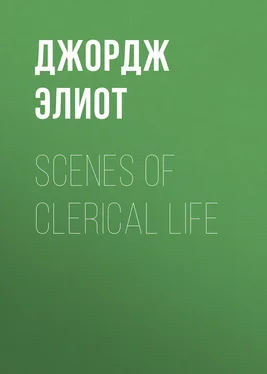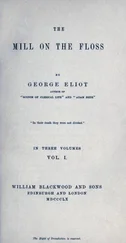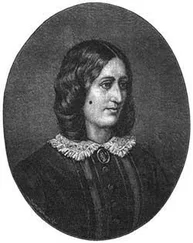Джордж Элиот - Scenes of Clerical Life
Здесь есть возможность читать онлайн «Джордж Элиот - Scenes of Clerical Life» — ознакомительный отрывок электронной книги совершенно бесплатно, а после прочтения отрывка купить полную версию. В некоторых случаях можно слушать аудио, скачать через торрент в формате fb2 и присутствует краткое содержание. Жанр: foreign_antique, Религиозная литература, foreign_religion, на английском языке. Описание произведения, (предисловие) а так же отзывы посетителей доступны на портале библиотеки ЛибКат.
- Название:Scenes of Clerical Life
- Автор:
- Жанр:
- Год:неизвестен
- ISBN:нет данных
- Рейтинг книги:5 / 5. Голосов: 1
-
Избранное:Добавить в избранное
- Отзывы:
-
Ваша оценка:
- 100
- 1
- 2
- 3
- 4
- 5
Scenes of Clerical Life: краткое содержание, описание и аннотация
Предлагаем к чтению аннотацию, описание, краткое содержание или предисловие (зависит от того, что написал сам автор книги «Scenes of Clerical Life»). Если вы не нашли необходимую информацию о книге — напишите в комментариях, мы постараемся отыскать её.
Scenes of Clerical Life — читать онлайн ознакомительный отрывок
Ниже представлен текст книги, разбитый по страницам. Система сохранения места последней прочитанной страницы, позволяет с удобством читать онлайн бесплатно книгу «Scenes of Clerical Life», без необходимости каждый раз заново искать на чём Вы остановились. Поставьте закладку, и сможете в любой момент перейти на страницу, на которой закончили чтение.
Интервал:
Закладка:
For the flickering of Mrs. Patten's bright fire is reflected in her bright copper tea-kettle, the home-made muffins glisten with an inviting succulence, and Mrs. Patten's niece, a single lady of fifty, who has refused the most ineligible offers out of devotion to her aged aunt, is pouring the rich cream into the fragrant tea with a discreet liberality.
Reader! did you ever taste such a cup of tea as Miss Gibbs is this moment handing to Mr. Pilgrim? Do you know the dulcet strength, the animating blandness of tea sufficiently blended with real farmhouse cream? No—most likely you are a miserable town-bred reader, who think of cream as a thinnish white fluid, delivered in infinitesimal pennyworths down area steps; or perhaps, from a presentiment of calves' brains, you refrain from any lacteal addition, and rasp your tongue with unmitigated bohea. You have a vague idea of a milch cow as probably a white-plaster animal standing in a butterman's window, and you know nothing of the sweet history of genuine cream, such as Miss Gibbs's: how it was this morning in the udders of the large sleek beasts, as they stood lowing a patient entreaty under the milking-shed; how it fell with a pleasant rhythm into Betty's pail, sending a delicious incense into the cool air; how it was carried into that temple of moist cleanliness, the dairy, where it quietly separated itself from the meaner elements of milk, and lay in mellowed whiteness, ready for the skimming-dish which transferred it to Miss Gibbs's glass cream-jug. If I am right in my conjecture, you are unacquainted with the highest possibilities of tea; and Mr. Pilgrim, who is holding that cup in his hands, has an idea beyond you.
Mrs. Hackit declines cream; she has so long abstained from it with an eye to the weekly butter-money, that abstinence, wedded to habit, has begotten aversion. She is a thin woman with a chronic liver-complaint, which would have secured her Mr. Pilgrim's entire regard and unreserved good word, even if he had not been in awe of her tongue, which was as sharp as his own lancet. She has brought her knitting—no frivolous fancy knitting, but a substantial woollen stocking; the click-click of her knitting-needles is the running accompaniment to all her conversation, and in her utmost enjoyment of spoiling a friend's self-satisfaction, she was never known to spoil a stocking. Mrs. Patten does not admire this excessive click-clicking activity. Quiescence in an easy-chair, under the sense of compound interest perpetually accumulating, has long seemed an ample function to her, and she does her malevolence gently. She is a pretty little old woman of eighty, with a close cap and tiny flat white curls round her face, as natty and unsoiled and invariable as the waxen image of a little old lady under a glass-case; once a lady's-maid, and married for her beauty. She used to adore her husband, and now she adores her money, cherishing a quiet blood-relation's hatred for her niece, Janet Gibbs, who, she knows, expects a large legacy, and whom she is determined to disappoint. Her money shall all go in a lump to a distant relation of her husband's, and Janet shall be saved the trouble of pretending to cry, by finding that she is left with a miserable pittance.
Mrs. Patten has more respect for her neighbour Mr. Hackit than for most people. Mr. Hackit is a shrewd substantial man, whose advice about crops is always worth listening to, and who is too well off to want to borrow money.
And now that we are snug and warm with this little tea-party, while it is freezing with February bitterness outside, we will listen to what they are talking about.
'So,' said Mr. Pilgrim, with his mouth only half empty of muffin, 'you had a row in Shepperton Church last Sunday. I was at Jim Hood's, the bassoon-man's, this morning, attending his wife, and he swears he'll be revenged on the parson—a confounded, methodistical, meddlesome chap, who must be putting his finger in every pie. What was it all about?'
'O, a passill o' nonsense,' said Mr. Hackit, sticking one thumb between the buttons of his capacious waistcoat, and retaining a pinch of snuff with the other—for he was but moderately given to 'the cups that cheer but not inebriate', and had already finished his tea; 'they began to sing the wedding psalm for a new-married couple, as pretty a psalm an' as pretty a tune as any in the prayer-book. It's been sung for every new-married couple since I was a boy. And what can be better?' Here Mr. Hackit stretched out his left arm, threw back his head, and broke into melody—
'O what a happy thing it is,
And joyful for to see,
Brethren to dwell together in
Friendship and unity.
But Mr. Barton is all for th' hymns, and a sort o' music as I can't join in at all.'
'And so,' said Mr. Pilgrim, recalling Mr. Hackit from lyrical reminiscences to narrative, 'he called out Silence! did he? when he got into the pulpit; and gave a hymn out himself to some meeting-house tune?'
'Yes,' said Mrs. Hackit, stooping towards the candle to pick up a stitch, 'and turned as red as a turkey-cock. I often say, when he preaches about meekness, he gives himself a slap in the face. He's like me—he's got a temper of his own.'
'Rather a low-bred fellow, I think, Barton,' said Mr. Pilgrim, who hated the Reverend Amos for two reasons—because he had called in a new doctor, recently settled in Shepperton; and because, being himself a dabbler in drugs, he had the credit of having cured a patient of Mr. Pilgrim's. 'They say his father was a Dissenting shoemaker; and he's half a Dissenter himself. Why, doesn't he preach extempore in that cottage up here, of a Sunday evening?'
'Tchuh!'—this was Mr. Hackit's favourite interjection—'that preaching without book's no good, only when a man has a gift, and has the Bible at his fingers' ends. It was all very well for Parry—he'd a gift; and in my youth I've heard the Ranters out o' doors in Yorkshire go on for an hour or two on end, without ever sticking fast a minute. There was one clever chap, I remember, as used to say, "You're like the woodpigeon; it says do, do, do all day, and never sets about any work itself." That's bringing it home to people. But our parson's no gift at all that way; he can preach as good a sermon as need be heard when he writes it down. But when he tries to preach wi'out book, he rambles about, and doesn't stick to his text; and every now and then he flounders about like a sheep as has cast itself, and can't get on'ts legs again. You wouldn't like that, Mrs. Patten, if you was to go to church now?'
'Eh, dear,' said Mrs. Patten, falling back in her chair, and lifting up her little withered hands, 'what 'ud Mr. Gilfil say, if he was worthy to know the changes as have come about i' the Church these last ten years? I don't understand these new sort o' doctrines. When Mr. Barton comes to see me, he talks about nothing but my sins and my need o' marcy. Now, Mr. Hackit, I've never been a sinner. From the fust beginning, when I went into service, I al'ys did my duty by my emplyers. I was a good wife as any in the county—never aggravated my husband. The cheese-factor used to say my cheese was al'ys to be depended on. I've known women, as their cheeses swelled a shame to be seen, when their husbands had counted on the cheese-money to make up their rent; and yet they'd three gowns to my one. If I'm not to be saved, I know a many as are in a bad way. But it's well for me as I can't go to church any longer, for if th' old singers are to be done away with, there'll be nothing left as it was in Mr. Patten's time; and what's more, I hear you've settled to pull the church down and build it up new?'
Now the fact was that the Rev. Amos Barton, on his last visit to Mrs. Patten, had urged her to enlarge her promised subscription of twenty pounds, representing to her that she was only a steward of her riches, and that she could not spend them more for the glory of God than by giving a heavy subscription towards the rebuilding of Shepperton Church—a practical precept which was not likely to smooth the way to her acceptance of his theological doctrine. Mr. Hackit, who had more doctrinal enlightenment than Mrs. Patten, had been a little shocked by the heathenism of her speech, and was glad of the new turn given to the subject by this question, addressed to him as church-warden and an authority in all parochial matters.
Читать дальшеИнтервал:
Закладка:
Похожие книги на «Scenes of Clerical Life»
Представляем Вашему вниманию похожие книги на «Scenes of Clerical Life» списком для выбора. Мы отобрали схожую по названию и смыслу литературу в надежде предоставить читателям больше вариантов отыскать новые, интересные, ещё непрочитанные произведения.
Обсуждение, отзывы о книге «Scenes of Clerical Life» и просто собственные мнения читателей. Оставьте ваши комментарии, напишите, что Вы думаете о произведении, его смысле или главных героях. Укажите что конкретно понравилось, а что нет, и почему Вы так считаете.










